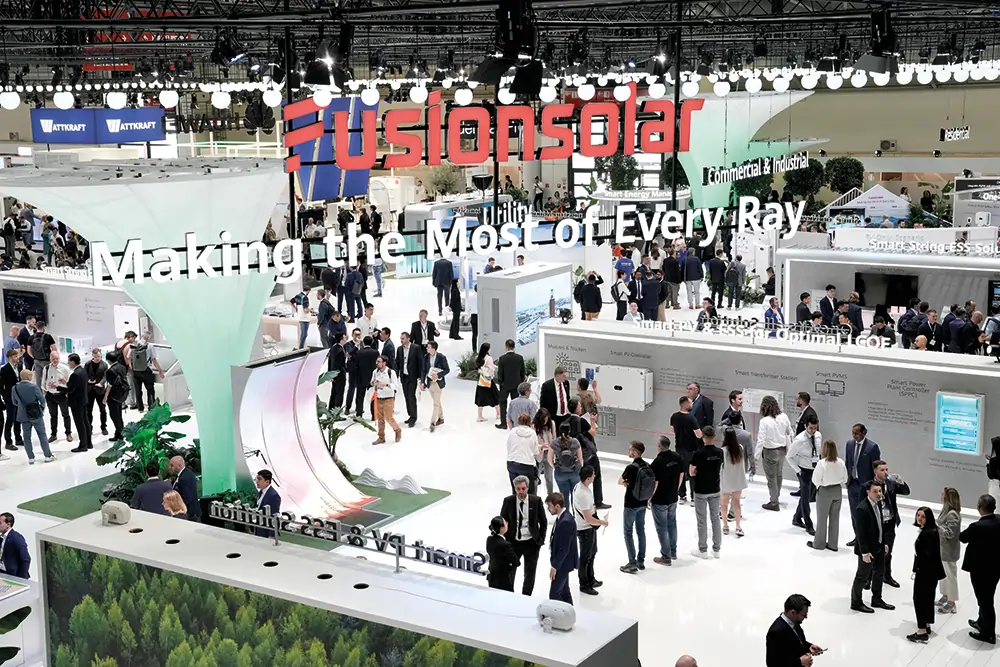Renewable energies are gaining ground fast
From June 19–21 at Messe München, The smarter E Europe sets the stage for the renewables sector to showcase why the future is bright for sustainable energy
The transition to a renewable energy supply is in full swing. Photovoltaics, in particular, is experiencing dynamic growth on a global scale. Renewables are increasingly replacing fossil fuels as they become more profitable. The International Energy Agency (IEA) predicts that renewables will surpass coal by early 2025, becoming the energy source with the largest electricity generation capacity in the world. Wind and solar energy will each supply more electricity than nuclear power plants by 2025 and 2026, respectively. The message is clear: renewable energy is gaining ground fast.
The gigawatt boom
2023 marked the first year in which more than one gigawatt (GW) of PV capacity was installed per day – equivalent to the output of a large coal or nuclear power plant. Twenty years ago, it took a whole year to reach this amount; in 2010 it took one month. It is pioneers such as China, which deployed 216 gigawatts (GW) of PV capacity in 2023 (more than the entire world added in the previous year), who are responsible for this development.
But it’s not just China: Europe is also making great strides in the deployment of renewable sources of energy. For example, in 2023, Germany installed a record 14 GW of PV alone, placing it at the top of the European solar rankings, followed by Spain, Italy, Poland and the Netherlands. Germany’s share of renewable energy in net electricity generation is nearly 60%, twice as high as ten years ago. In the fall of 2023, Portugal set a shining example: For six days in a row, the country’s electricity demand was met entirely by renewable sources.
Dynamic deployment rates and the prospect of an emission-free energy generation also prove that changing the system is inevitable. An energy supply based entirely on renewables requires a transition to a decentralised and intelligent power and heat supply.

Flexibilisation and digitalisation
While the deployment of renewable generation capacity is making great progress, the focus must now shift to accelerating the flexibilisation and digitalisation of the energy industry, reducing existing regulatory obstacles and further electrifying the energy system. Harnessing the potential of flexibility plays an important role in stabilising the natural volatility of sun and wind, ensuring a renewable 24/7 energy supply. The first and easiest way to profit from flexibility is optimising on-site consumption. This is where energy management systems come into play. The introduction of dynamic electricity tariffs will also help to balance generation and consumption through incentive systems.
A smarter combination of exhibitions
The latest trends and innovations in digitalisation and flexibilisation of the power supply will be presented at The smarter E Europe. Taking place from June 19–21 at Messe München, the continent’s largest alliance of exhibitions for renewable energy supply in the electricity, heat and transportation sectors, and its four parallel exhibitions Intersolar Europe, ees Europe, Power2Drive Europe, and EM-Power Europe sets the stage for the power of tomorrow.
At these exhibitions, visitors will learn more about the latest applications and intelligent combination solutions. They can also expand their expert knowledge at the four accompanying conferences, six topical exhibition forums, as well as numerous side events. More than 2,800 exhibitors will be showcasing their products to an expected 115,000 international visitors on 206,000-sqm of exhibition space across 19 exhibition halls and an outdoor area.
Further information
www.thesmartere.de

